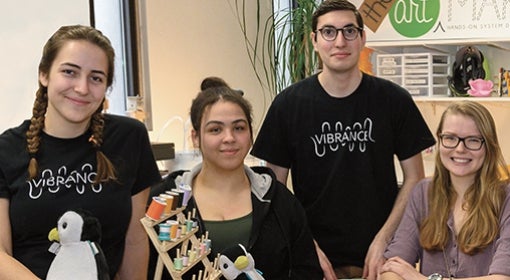It’s September 2007, and Michael Kenney finds himself in a car with four strangers. He’s in London, and the men he’s seated beside are members of al-Muhajiroun, or the Emigrants, an outlawed activist network believed to be cultivating fighters for ISIS and seeking to create an Islamic state in Britain, where supporters have been implicated in terrorist attacks.
Kenney, a Pitt political scientist studying terrorism and violent extremism, was connected to the group through a confidential acquaintance. That car ride and the conversations thereafter soon open doors to a network of others engaged in radicalization.
Over eight years, Kenney, who has been a consultant with the FBI and an external reviewer for the Department of Homeland Security, travels back and forth to London. He conducts 148 interviews with Emigrants leaders, the rank and file, and former activists. He observes street preaching and political protests, and he is welcomed in to private education centers where Emigrants leaders lecture on the network’s ideology. He chats with activists in restaurants, records their interviews and speeches, and takes photos as the Emigrants engage in activism.
The result of his immersion is a pioneering ethnography of a European network implicated in terror. “The Islamic State in Britain: Radicalization and Resilience in an Activist Network” wins the 2019 Best Book Award from the Political Networks section of the American Political Science Association and is cited by the United Kingdom’s Commission for Countering Extremism.
The book probes the inner world of the radical group—how it functions and why it draws people in. But Kenney’s study also broadens readers’ understanding of radicalization and offers fresh insights into how violent extremism might be prevented.
Kenney began his research career studying the drug trade and drug policy. But after the terrorist attacks on Sept. 11, 2001, he expanded his work to include terrorism. He also began studying violent non-state actors, applying theories of how organizations learn and adapt, so he could better understand how they modify their activities in response to government pressure.
 Today, he is the Wesley W. Posvar Chair in International Security Studies with Pitt’s Graduate School of Public and International Affairs and director of the Ridgway Center, where his work connects to and helps train the next generation of security-related research analysts.
Today, he is the Wesley W. Posvar Chair in International Security Studies with Pitt’s Graduate School of Public and International Affairs and director of the Ridgway Center, where his work connects to and helps train the next generation of security-related research analysts.
While studying the Emigrants, Kenney discovered a highly nuanced network that offers youthful followers a needed sense of identity and belonging. At the same time, they are connected to and inspired by an ideology that claims that a war on terror is a war on Islam.
“This deeply felt ideology is unshaken by incarceration, state orders against antisocial behavior or terrorism-prevention measures,” he says.
Although media coverage paints the membership as large and directly engaged in terrorist violence, Kenney found that the Emigrants are a smaller network of only a couple of hundred people who principally participate in activism, such as public protests and street preaching.
He also found that membership in the Emigrants is not a “gateway” to terrorism, but instead a “safety valve,” directing rebellious young people toward nonviolent activism (street preaching, rallies) and binding many of them to a covenant of security, which means not attacking the people with whom you live.
Additionally, Kenney found the Emigrants to be a persistent, resilient group. Much of its durability, he suggests, is owed to spirited recruiting, as well as to the creation of local clusters and support networks that build personal relationships and facilitate indoctrination.
This is where Kenney suggests that the battle against violent extremism and terrorism must transcend government legislation. One way to fight back, he says, is to borrow the Emigrants’ model and understand the influence of personal relationships on otherwise disaffected youth. As we seek to counter violent extremism and terrorism, we may need to look not just at legislative and military sources, but at human resources as well.
In Britain, that means forging relations with former extremists who have left political violence and found a way forward in mainstream society. Getting young adherents connected to caring networks of family, friends and supporters will help them begin to build new identities and disengage from groups like al-Muhajiroun.
This insight, Kenney believes, is applicable to individuals who are drawn into extremist groups from across the political spectrum—in Britain and the United States.
One thing is clear, he says: “We’re not going to simply legislate our way out of this problem. We have to draw on resources from local communities.”
Breakthroughs in the Making
Hurtful Thinking
Can harboring certain attitudes about masculinity affect men’s mental health and behavior? Yes, according to researchers at UPMC Children’s Hospital of Pittsburgh and the gender equity organization Promundo-US. Their study, published in Preventive Medicine, applied data on 3,600 men to a scale used to measure harmful norms and stereotypes about masculinity such as acting tough, self-sufficiency and hypersexuality. They found that those who scored higher on the scale also tended toward bullying, sexual harassment, depression and suicidal thoughts. “These findings highlight how detrimental harmful masculinities can be to the people who endorse them,” as well as to their communities, says lead author and Pitt medical student Amber Hill. Researchers hope the findings will help clinicians more efficiently monitor their male patients’ health.
Heart Attack Help
When someone suffers chest pain and calls 9-1-1 for a possible heart attack, medics do an electrocardiogram (ECG) to examine the heart’s rhythms and determine its condition. Detecting more subtle cardiac emergencies, however, often requires more testing and observation. Now, Pitt Nursing Associate Professor Salah Al-Zaiti and a multidisciplinary team have developed an artificial intelligence system based on ECG data from previous medical events. It can significantly increase a clinician’s ability to identify cases of myocardial ischemia (reduced blood flow to the heart usually caused by a blockage) during initial screenings. Their work, published in Nature Communications, could help speed up treatment for those who need it.
Listen and Learn
It can be difficult to learn a second language—especially one like Mandarin Chinese, which uses adjustments in pitch to change the meaning of words that otherwise sound the same. But new research by neuroscientists and linguists at Pitt and the University of California San Francisco reveals that a simple earbud-like device that imperceptibly stimulates a key nerve leading to the brain significantly improves the wearer’s ability to learn the sounds of a new language. Former Pitt researcher and the study’s lead author Fernando Llanos notes that the development suggests that noninvasive peripheral nerve stimulation could help cognitive performance in other subjects, too.
This article appears in the Fall 2020 edition of Pitt Magazine.





